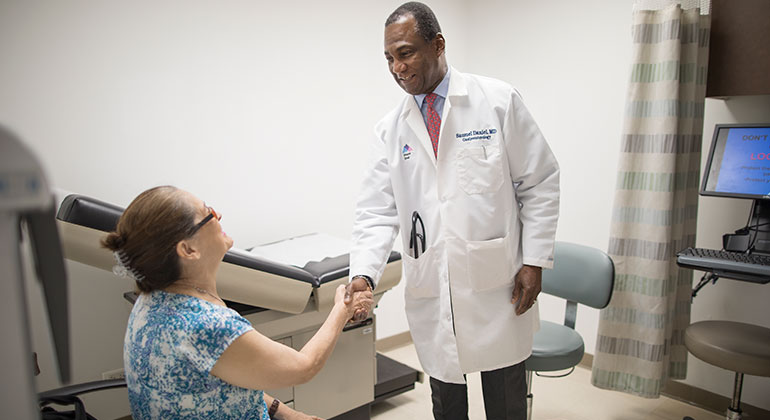Nonalcoholic Fatty Liver Disease

Mount Sinai Health System liver experts (hepatologists) offer highly specialized and multidisciplinary care for nonalcoholic fatty liver disease. This disease is increasing in frequency due to more common occurrence of metabolic issues, such as obesity, diabetes, high cholesterol, and high blood pressure. We treat the nonalcoholic fatter liver disease by targeting these metabolic risk factors, common in both adults and children. At Mount Sinai, you also have access to clinical trials we are conducting to find promising new experimental treatments.
What Is Nonalcoholic Fatty Liver Disease?
The liver plays a key role in processing nutrients in your diet and removing harmful substances from the body. When excess fat collects in the liver, whether through increased dietary fat intake or from changes in your body’s ability to digest fats, it can lead to this disease.
Nonalcoholic fatty liver disease is a liver condition in both adults and children where excess fat accumulates around the liver. The disease is the most common liver disease in developed countries. As its name indicates, the disease is not due to alcohol use, but is often associated with metabolic syndromes such as:
- Diabetes
- High blood pressure
- High cholesterol
- Obesity
Chronic nonalcoholic fatter liver disease can produce mild symptoms or cause serious symptoms from scarring (fibrosis). When severe, the condition can lead to cirrhosis and possible liver cancer.
Symptoms
You may not experience symptoms at the early stages of the nonalcoholic fatty liver disease. However, you may feel discomfort in your abdominal area due to the liver becoming enlarged during early stages of the disease.
Once the disease has progressed to an end-stage of cirrhosis, or if liver cancer has developed, you will experience the following symptoms:
- Fatigue
- Jaundice or yellowing of skin and whites of the eyes
- Lack of appetite
- Muscle weakness
- Nausea
- Pain in the upper right side of the abdomen
- Weight loss
Diagnosis and Treatment
Your doctor may discover nonalcoholic fatty liver disease through routine blood tests or imaging, working collaboratively with the Pathology and Radiology Departments.
Our liver disease experts can confirm a diagnosis with the following tests:
- Blood tests: analyze blood to detect abnormalities in the body
- CT scan: computed tomography is a special X-ray that uses a computer to view the internal organs
- Fibroscan: a specialized ultrasound machine that measures scarring and fatty content of the liver
- Liver biopsy: removes a tissue sample from the liver for analysis
- MRI: magnetic resonance imaging uses a magnetic field and radio waves to view internal organs
- Ultrasound: a special technique to view blood flow through the body
There is no medication approved by the Food and Drug Administration to treat nonalcoholic fatty liver disease directly. We can, however, use a multidisciplinary approach to minimize your symptoms and the effects of metabolic conditions that cause the buildup of fat in your liver.
One important way to control the disease is by helping you lose weight with an exercise plan and dietary modifications. Suggested dietary changes include avoiding and limiting foods that have:
- High amounts of fructose syrup
- Saturated fats
- Trans fats
If your disease has progressed to cirrhosis or liver cancer, our liver specialists have the resources to treat these conditions. In collaboration with Mount Sinai’s Diabetes Center and our weight loss and bariatric surgery teams, we offer you a multidisciplinary approach to managing advanced nonalcoholic fatty liver disease.
For the most advanced liver disease and liver cancer, we also provide referrals to Mount Sinai specialists through our:
- Recanati/Miller Transplantation Institute for liver transplantation
- Interventional Radiology team
- Surgical Oncology team
Mount Sinai conducts clinical trials, and as a patient, you may enroll. You can talk with your doctor to learn more.
Nonalcoholic Steatohepatitis
Some patients with nonalcoholic fatty liver disease may have a more severe form of the disease known as nonalcoholic steatohepatitis. This disease rarely has symptoms but can lead to cirrhosis and liver cancer.
Our specialists diagnose the disease by evaluating abnormal liver tests, which may result from imaging of the abdomen (ultrasound, CT scan, MRI), or sometimes from surgery, such as gallbladder surgery or weight reduction surgery. Approximately one-third of patients who undergo weight reduction surgery have nonalcoholic steatohepatitis.
Diagnosis of the disease is important so that we can intervene to reduce the risk of its progressing. Your treatment plan may include making changes to your diet and controlling coexisting metabolic syndrome conditions: diabetes or high cholesterol. We also offer access to clinical trials of new treatments; currently there are no FDA-approved medications for nonalcoholic steatohepatitis.